The AMD 2nd Gen Ryzen Deep Dive: The 2700X, 2700, 2600X, and 2600 Tested
by Ian Cutress on April 19, 2018 9:00 AM ESTCPU Office Tests
The office programs we use for benchmarking aren't specific programs per-se, but industry standard tests that hold weight with professionals. The goal of these tests is to use an array of software and techniques that a typical office user might encounter, such as video conferencing, document editing, architectural modelling, and so on and so forth.
All of our benchmark results can also be found in our benchmark engine, Bench.
Chromium Compile (v56)
Our new compilation test uses Windows 10 Pro, VS Community 2015.3 with the Win10 SDK to combile a nightly build of Chromium. We've fixed the test for a build in late March 2017, and we run a fresh full compile in our test. Compilation is the typical example given of a variable threaded workload - some of the compile and linking is linear, whereas other parts are multithreaded.
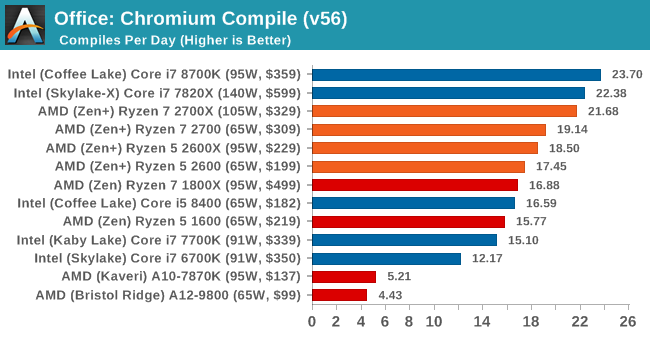
Having redone our compile testing, we can see that the new Ryzen-2000 series parts do provide a good uplift over the first generation, likely due to the decreased cache latencies and better precision boost. Performance per dollar between the 8700K and the 2700X would seem to be about equal as well.
PCMark8: link
Despite originally coming out in 2008/2009, Futuremark has maintained PCMark8 to remain relevant in 2017. On the scale of complicated tasks, PCMark focuses more on the low-to-mid range of professional workloads, making it a good indicator for what people consider 'office' work. We run the benchmark from the commandline in 'conventional' mode, meaning C++ over OpenCL, to remove the graphics card from the equation and focus purely on the CPU. PCMark8 offers Home, Work and Creative workloads, with some software tests shared and others unique to each benchmark set.
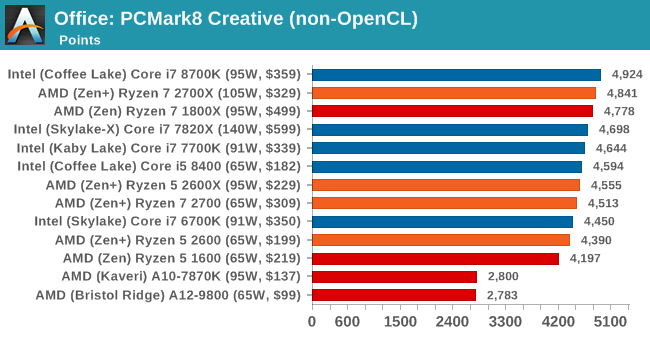
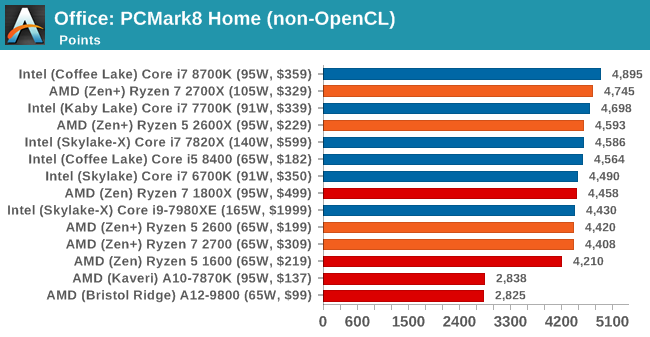

PCMark 10
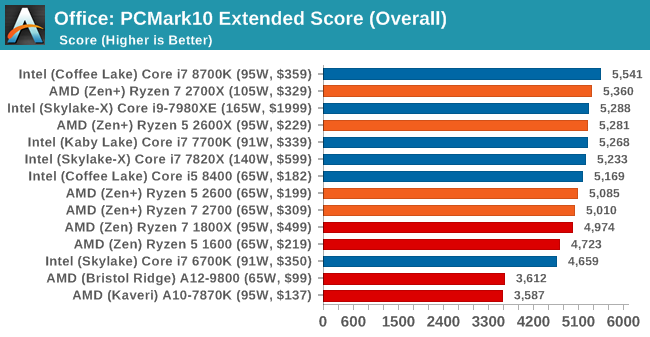
GeekBench4
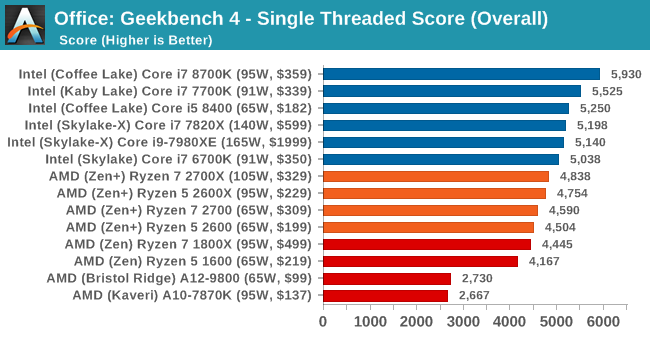
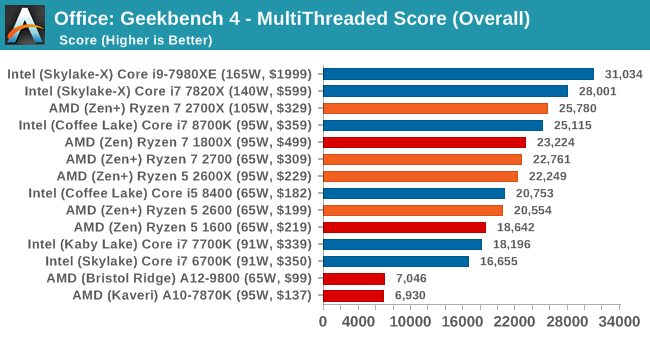
If you live and breathe GeekBench 4, then the single threaded results put Intel firmly in first place. For the multi-threaded tests, the top Intel and AMD mainstream parts are going at it almost neck-and-neck, however it is clear that the previous generation quad-cores are falling behind.










545 Comments
View All Comments
techguymaxc - Thursday, April 19, 2018 - link
Either you don't have a fast enough GPU to remove the GPU bottleneck or there's something wrong with your data because there is NO chance Ryzen is faster than *lake in GTA V, with lower IPC and clocks.Don't get me wrong, Ryzen 2 looks like a good product family and I wouldn't discourage anyone from buying.
SaturnusDK - Thursday, April 19, 2018 - link
As everyone else that are misreading the results. Tests are done at stock speeds and no overclocking.LurkingSince97 - Thursday, April 19, 2018 - link
Yes there is.Stock CPU and RAM speeds. Fully spectre / meltdown patched on both sides. Who is re-using old results? This review re-uses old results for the older generation Ryzen, and so some of the performance boost could be false (new drivers, OS patches, firmware, bios....).
More investigation is needed on all sides. Many other review sites are significantly more lazy than AT and are likely recycling old results for the Intel side.
As for your GPU bottleneck.... um no. Look at the results, as the resolution goes up, THEN you get GPU bottlenecked and all CPUs look the same. At low resolutions, it is clearly not GPU bottlenecked as there is a big FPS difference by CPU.
jaydee - Thursday, April 19, 2018 - link
Great review. Curious to see how things scale down for a 35W TDP part compared to Intel's latest 35W TDP CPUs.SaturnusDK - Thursday, April 19, 2018 - link
Gamers Nexus have tested the 2700X to work at 1.175V locked to 4.1GHz where it consumes 129W compared to stock frequency and stock voltage where it consumes 200W. Performance is generally the same on average.Flunk - Thursday, April 19, 2018 - link
Wow, that single-thread performance delta sure has shrunk hasn't it? Between meltdown and higher core clocks on the Zen+.mapesdhs - Saturday, April 21, 2018 - link
Wonder whether it won't be that much longer until AMD launches something which actually beats Intel in IPC. Atm, people keep saying Intel wins on IPC, but it's only because Intel has punched its clock rates through the roof (it's like the old P4 days again), something they could have done years ago but never bothered because there was no competition, just as they could have released a consumer 8-core long ago but didn't (the 3930K was a crippled 8-core, but back then AMD couldn't even beat mainstream SB, never mind SB-E).mkaibear - Monday, April 23, 2018 - link
You know IPC is "instructions per clock", yeah? So saying Intel wins on IPC because their clock rate is faster doesn't make sense, it's like saying UK cars have a higher mpg then US cars because their gallons are bigger.Intel wins (won?) on IPC because they executed more instructions per MHz of the clock rate. When you couple that with a faster clock rate you get a double whammy of performance. It does appear that AMD has almost closed the door on IPC but is still not operating on as high a clock rate.
Targon - Monday, April 23, 2018 - link
This is why many are looking forward to Zen 2 in 2019, which will have true design improvements compared to Zen and Zen+. Zen+ is a small and incremental improvement over Zen(first generation Ryzen chips). Combined with 7nm, we may very well see AMD get very close to Intel clock speeds while having very similar, if not better IPC and a higher core count.MajGenRelativity - Thursday, April 19, 2018 - link
Looks like a good review. Glad to see AMD closing the performance gap even further!